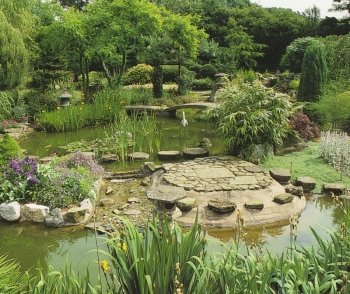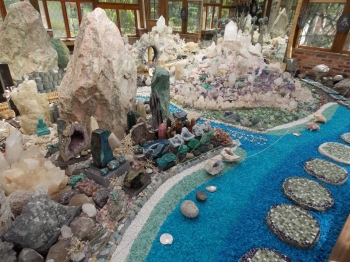A Brief History of the Formation of the Land of Bliss
According to the Infinite Life Sutra, in the era of Lokeshvararaja Tathagata, there was once a king who left his royal family and became a wise bhikshu (monk) named Dharmakara. He asked the Tathagata to speak of the Pure Lands of all Buddhas and their conduct in excellence. Thus, the Tathagata described 21 billion Pure Lands, and revealed them all to Dharmakara. Taking the perfections and all excellences and good qualities of all the Buddha lands into account, Dharmakara took up pure practices, and over the course of five kalpas, designed and formulated the specifications in the “creation” of his own Pure Land.
After he had completed the master plan, he came before the Tathagata and made 48 great vows, saying that he would not become a Buddha if any of them was not realized. Dharmakara has now been a Buddha, called Amitabha, for ten kalpas. His Pure Land is called Sukhavati, the Land of Bliss, and is located far away in the west of our world. After the formation of his Pure Land, Amitabha continues to cultivate and accumulate immeasurable real merits and virtues for sentient beings in the ten directions, in order to help them to be reborn in his Land of Bliss.
The Land of Bliss is a Splendid Realm of Unconditioned Nirvana
The Infinite Life Sutra says: “Bhikshu Dharmakara was solely intent on producing a glorious and exquisite land. The Buddha-land which he sought to establish was vast in extent, unsurpassed and supremely wonderful, always present and subject neither to decay nor change. During inconceivable and innumerable kalpas, he cultivated the immeasurable meritorious practices of the bodhisattva path.” The glorious and exquisite Land of Bliss created by Amitabha is different in nature from our Saha World. In the Saha World, all phenomena are impermanent: they are not always present, and are subject to decay and change.
The sutra further indicates the difference between the Land of Bliss and the Saha World: “He [Amitabha] did not harbor any thought of greed, hatred, or cruelty; nor did he allow any ideas of greed, hatred or cruelty to arise. He was unattached to any form, sound, smell, taste, touch, or idea. Possessed of the power to persevere, he did not avoid undergoing various afflictions. Having little desire for his own sake, he knew contentment. Without any impure thought, enmity or stupidity, he dwelt continually in tranquil samadhi. His wisdom was unobstructed, and his mind free of falsehood and deceitfulness.” These are all pure practices necessary for bodhisattvas in the causal ground before they attain Buddhahood. It should be noted that the Land of Bliss is adorned by Amitabha’s real merits and virtues, and is therefore totally different from our world. Our world is basically formed through the impure karmic causes of the Three Poisons—greed, hatred and delusion—according to the Law of Causal Conditioning.
In the Amitabha Sutra, Shakyamuni Buddha describes the scenery in the Land of Bliss, such as jeweled trees, netting, railings, ponds with flowers, and palaces, which are all manifested by Amitabha’s real merits and virtues. To conclude, that Buddha land, like the realm of unconditioned nirvana, is pure and serene, resplendent and blissful, as stated in the Infinite Life Sutra.
“Seed” of Virtue Necessary for Rebirth in the Land of Bliss
We come now to a crucial question: how can an immoral, ordinary being be born in this splendid realm of unconditioned nirvana? In Buddhism, we know that if we have the karmic cause, or “seed,” of the Three Poisons, we will be born in one of the three lower realms. If we practice the Five Precepts and the Ten Wholesome Deeds, we will be born in the human and god realms. As ordinary beings carry the karmic “seeds” of the Six Realms, they are bound by the force of karma to reincarnate within the Six Realms unceasingly.
If an ordinary being wishes to be free from the cycle of rebirth, he must cast aside all deviant views and purify himself of all karmic afflictions so that he is no longer bound by the force of karma. He then attains the “seed” of the sages and sets forth on the path of virtue, commencing the pure practices and cultivating the flawless or “real” merits and virtues. With the seed of virtue, he can be born in the lands of the holy, which are not accessible or visible to ordinary beings.
Similarly, if one wishes to be born in the Land of Bliss, the home land of the Buddha Amitabha and the realm of unconditioned nirvana, one must possess the equivalent “seed” of virtue to Amitabha himself. It should be noted that the precepts and practices of the mundane world cannot provide ordinary beings with the “seed” of virtue necessary for rebirth in the “real” Land of Bliss. These are “unreal” in nature and applicable only to the “unreal” world. Thus, there are “few virtuous roots and blessings,” as indicated by Shakyamuni Buddha in the Amitabha Sutra.
In the Amitabha Sutra, Shakyamuni further tells us that one way to attain the “seed” of virtue for rebirth in the Land of Bliss is to recite Amitabha’s name exclusively. One will then be embraced immediately and naturally by the infinite light of Amitabha, with his real merits and virtues. Thereby one can purify all the karmic obscurations in the mundane world, and also generate the “seed” of virtue with the “abundant virtuous roots and blessings” necessary for rebirth in the Land of Bliss. Amitabha will automatically come to the reciter near the end of his life.
















